Using Place Value to Add
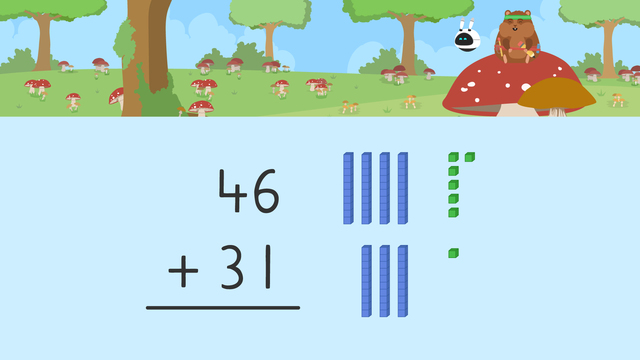

Basics on the topic Using Place Value to Add
Place Value Addition
What is place value addition? Place value addition is when you use the tool of place value to help while solving addition problems. The definition of place value is the value of each digit in a number. In this video, we explore using place value addition! Take a look below to learn more about place value chart addition.
When we talk about addition place value, we are discussing the value that each digit has depending on where it is in the number.
There are many different strategies to add, using a place value chart for addition is a great one!
Addition Using Place Value
When you use addition with place value chart, always start by representing the first addend using base ten blocks, then represent the second addend using base ten blocks.
Once you have represented the addends using base ten blocks, you can begin adding! There are three steps to follow in order to add using place value:
| Step # | What to do |
|---|---|
| 1 | Start with the ones place and add them together |
| 2 | Then, add the tens place addends together |
| 3 | Finally, add the tens and ones together one last time to find the sum |
Addition Using Place Value – Example
Let’s practice place value strategy addition with the example below.
Mr. Squeaks is adding the dandelions and tulips that he sees in the park! If there are thirty-five dandelions, and twenty-three tulips, how many flowers does he see in total? Remember, you can use place value to add!
- When using place value method addition, start by representing the addends using place value.
Then, you can add the addends from the ones place…
And then add the addends from the tens place.
How many flower did Mr. Squeaks find in total?
Mr. Squeaks found fifty-eight flowers in total!
Addition Using Place Value – Summary
When using place value to add remember to follow these steps:
Always start by representing the addends using base ten blocks
Next, add the ones place addends together.
Then, add the tens place addends together.
Finally, add the tens and ones together to find the sum.
Continue learning about multi-digit addition with place value charts with the method of place value addition using our interactive exercises, worksheets and further activities! You’ll also find worksheets for two digit addition using place value.
Transcript Using Place Value to Add
: "What a beautiful day in the park!" : "Imani, look! Butterflies!" : "There are SO many!" : "Hmm... how can we add ALL of them?" : "Using Place Value to Add" We can help Mr. Squeaks add using place value! When we talk about place value, we are discussing the value that each digit has depending on where it is in the number. Mr. Squeaks is adding the blue and the pink butterflies together. There are twenty-five blue butterflies and twenty-two pink butterflies. In order to see how many butterflies there are TOTAL, we will add twenty-five and twenty-two. When you add using place value, start by representing the first addend using base ten blocks. Our first addend is twenty-five, which is made up of two tens and five ones. We can represent two tens with two base ten rods and five ones with five ones blocks. Our next addend is twenty-two, which is represented by two tens and two ones. We can represent two tens with two base ten rods and two ones with two ones blocks. Now that we have represented the addends with base ten blocks we can begin adding. We can start with the ones place How many ones are there? Five ones plus two ones equals seven, so there are seven ones in total. After that we can add all of the TENS rods that we see together, how many tens rods are there? There are four tens rods (...) and if we add them together we get the number forty. Last, we can add the tens and ones together If we add forty plus seven we get the sum, forty-seven. Wow, there are forty-seven butterlies all together! Next, Mr. Squeaks and Imani found flowers (...) and are adding to find out how many there are. If there are thirty-five dandelions, and twenty-three tulips, how many flowers are there in total? Remember, FIRST we need to represent the numbers using base ten blocks. There are three tens and five ones in thirty-five, so we will need three tens rods and five ones blocks. Next, we can represent our second number using place value. There are two tens and three ones in twenty-three, so we will need two tens rods and three ones blocks. Now that we have represented the numbers with base ten blocks, we can begin adding. Remember to start by adding the ones place (...) five ones plus three ones equals eight ones. Then, we can add the tens together. Three tens plus two tens equals five tens, or, the number fifty. Last, we can add our five tens and eight ones together, how many are there? Fifty plus eight equals fifty-eight, so there are fifty-eight flowers in total! Next Imani and Mr. Squeaks have found some mushrooms! If there are forty-six small mushrooms, and thirty-one big mushrooms, how many are there in all? Try this one on your own, how many mushrooms are there in total? Remember, start by adding the ones place. Then, add the tens place together. Finally add the tens and ones together. There are seventy-seven mushrooms! Let's summarize! When adding using place value remember... always start by representing the addends using base ten blocks. Next, add the ones place together. Then, add the tens place together. Finally add the tens and ones together to get the sum. Now, let's see what Mr. Squeaks has found next! : "Wow, look at all the pretty clouds!" : "Wait a second, that one looks just like Imani!" : "Imani?"
Using Place Value to Add exercise
-
How many birds did Mr. Squeaks and Imani see?
HintsHow many tens are there altogether? How many ones are there altogether?
What do we get if we add the tens and ones together?
SolutionMr. Squeaks and Imani saw 57 birds.
If we add 3 ones plus 4 ones we get 7 ones.
If we add 2 tens plus 3 tens we get 5 tens or 50.
50 + 7 = 57.
-
Can you match the base ten blocks to the number sentence?
HintsSeparate each number into tens and ones:
- how many tens are there?
- how many ones are there?
For example, these base ten blocks represent 26 (20 + 6) plus 11 (10 + 1).
SolutionHere we can see the base ten that represents 22 + 17.
- There are two tens for 22 and one ten for 17 making three tens, or 30, altogether.
- There are two ones for 22 and seven ones for 17 making nine ones, or 9, altogether.
- 30 + 9 = 39
44 + 41
- Four tens for 44 and four tens for 41 making eight tens, or 80, altogether.
- Four ones for 44 and one one for 41 making five ones, or 5, altogether.
- 80 + 5 = 85
- Four tens for 46 and three tens for 32 making seven tens, or 70, altogether.
- Six ones for 46 and two ones for 32 making eight ones, or 8, altogether.
- 70 + 8 = 78
- Two tens for 23 and one ten for 15 making three tens, or 30, altogether.
- Three ones for 23 and five ones for 15 making eight ones, or 8, altogether.
- 30 + 8 = 38
-
Solve the addition expressions.
HintsThink about how many tens and how many ones are in each number to help you when adding.
You can draw out your own base ten blocks to help you.
If we were trying to solve 27 + 31 we would use base ten blocks like this.
Solution- 27 + 31 = 58
- 53 + 45 = 98
- 62 + 16 = 78
- 56 + 12 = 68
-
Which addition problems have the same answer?
HintsThink about how many tens and ones are in each number and then add these together.
You can draw your own base ten blocks to help you.
Solution48
- 24 + 24 = 48
- 31 + 17 = 48
- 42 + 17 = 59
- 36 + 23 = 59
- 32 + 27 = 59
- 34 + 33 = 67
- 25 + 42 = 67
-
How many trees did Mr. Squeaks and Imani see?
HintsHow many ones are there altogether?
How many tens are there altogether?
There are four tens or 40 and then five ones so what is 40 + 5?
SolutionMr. Squeaks and Imani saw 45 trees.
- If we add three tens from 32 and one ten from 13 we get four tens or 40.
- We then add two ones from 32 and three ones from 13 to make five ones or 5.
- 40 + 5 = 45.
-
What has Mr. Squeaks seen today?
HintsFind the key information first, what are you trying to find?
You are trying to find the total. Pick out the numbers that you need to add together.
Think about how many tens and ones are in each equation. You could draw them out to help you.
SolutionMr. Squeaks made it to the cafe! Below you can see the totals of all of the things he saw on his journey.
Mr. Squeaks is walking across the city this morning. First he saw 22 pigeons in the square and 14 pigeons in the tree. Altogether, he saw 36 pigeons.
He then walked past a bakery. In the window he saw 31 baguettes and 26 bagels. That makes 57 baked items altogether.
As he was walking down the road he saw 53 cars go past as well as 15 trucks. Mr. Squeaks saw 68 vehicles altogether.
Mr. Squeaks also saw the mail lady. She was delivering 72 letters and 17 packages. Altogether, she was delivering 89 items.
Mr. Squeaks had almost made it to the cafe, where he was meeting Imani, when he saw some dogs playing in the park. He didn't want to hang around too long, but he did see 25 Labradors and 14 Poodles. Altogether he saw 39 dogs.
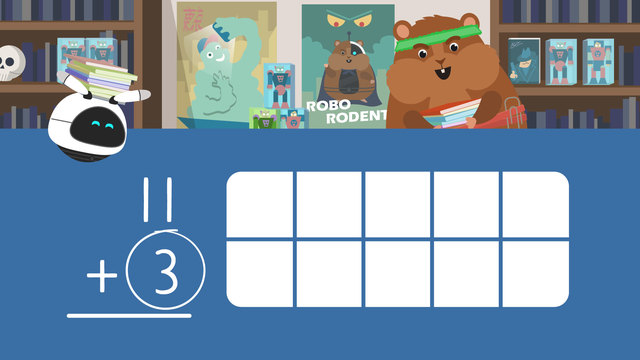
Adding a 1-Digit Number to a 2-Digit Number
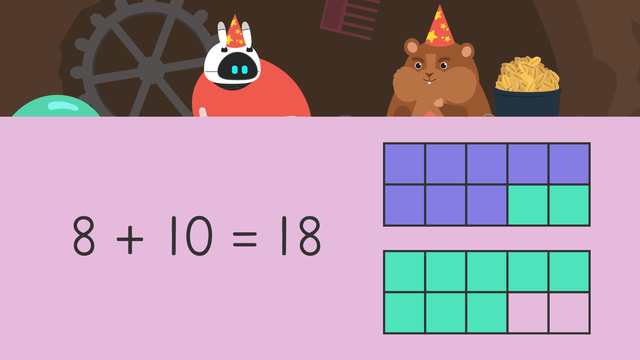
Order in Adding

Using Place Value to Add
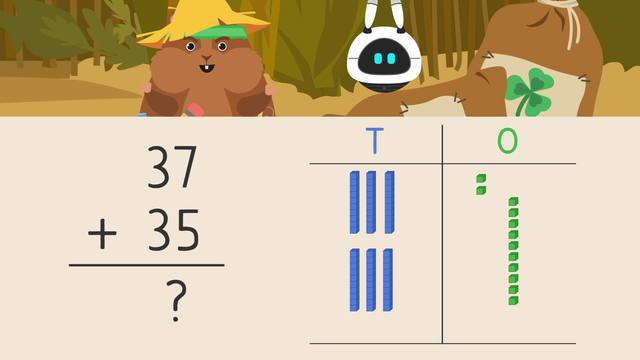
Using Place Value to Add Two Digit Numbers (Regrouping)
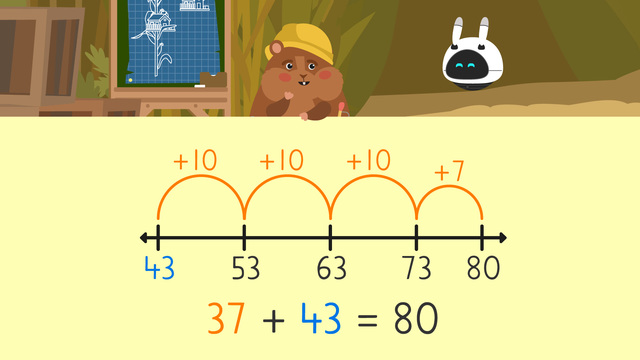
Make a Number Line to Add
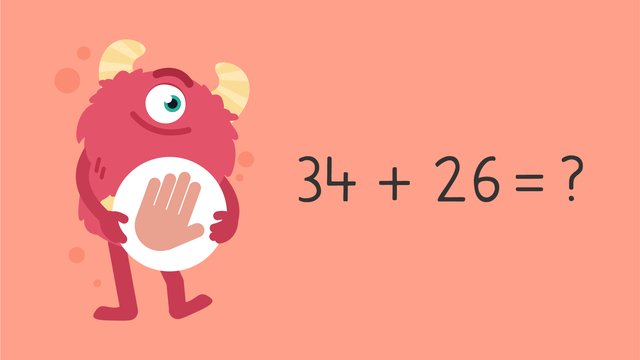
Make a Number Line to Add — Let's Practice!
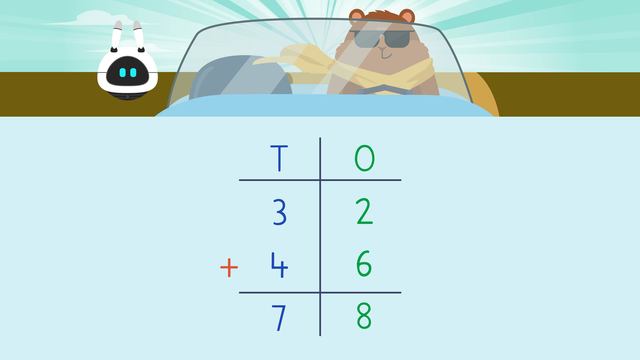
Addition Using Expanded Form
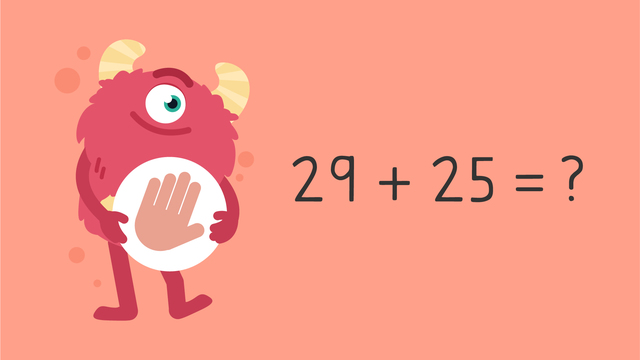
Compensation in Addition — Let's Practice!
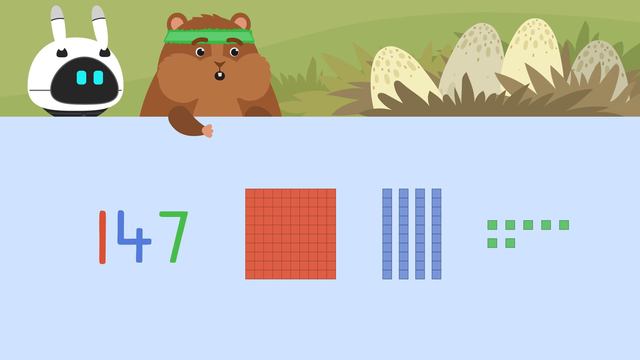
Addition with Regrouping - Ten
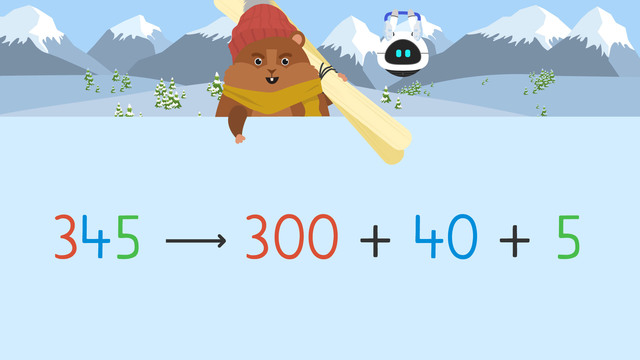
Three Digit Addition with Regrouping - Expanded Form
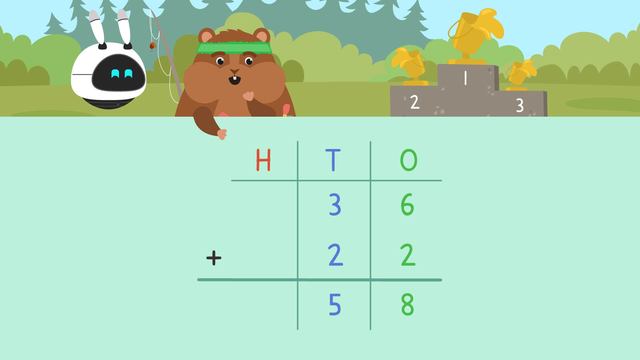
Adding 2 Digit Numbers Using Standard Algorithm
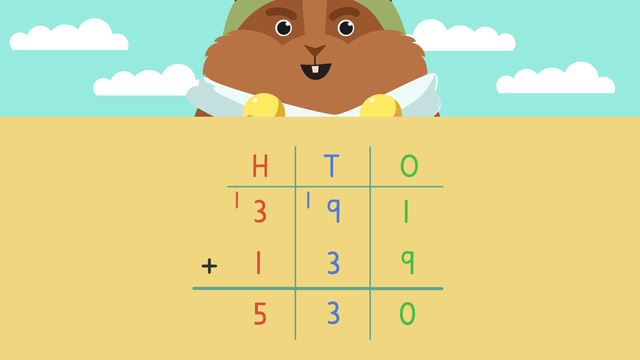
Adding 3 Digit Numbers Using Standard Algorithm
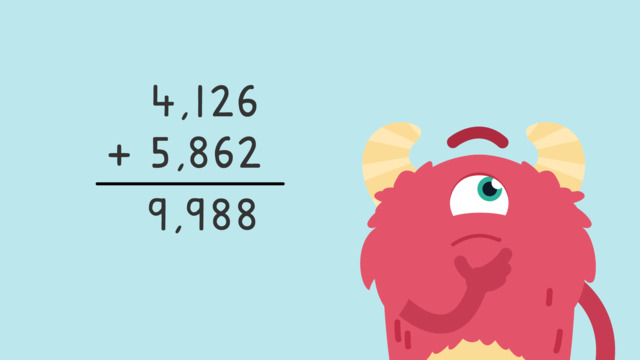
Adding Larger Numbers — Let's Practice!
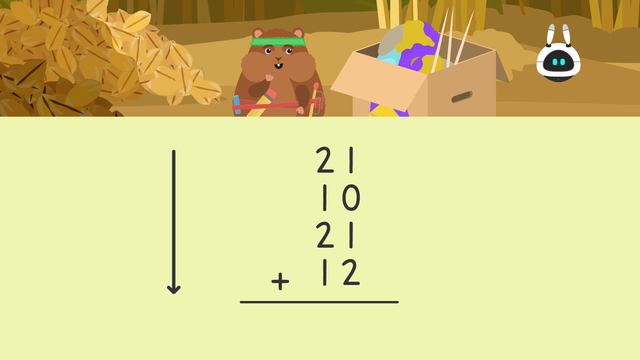
Adding Four Two Digit Numbers












